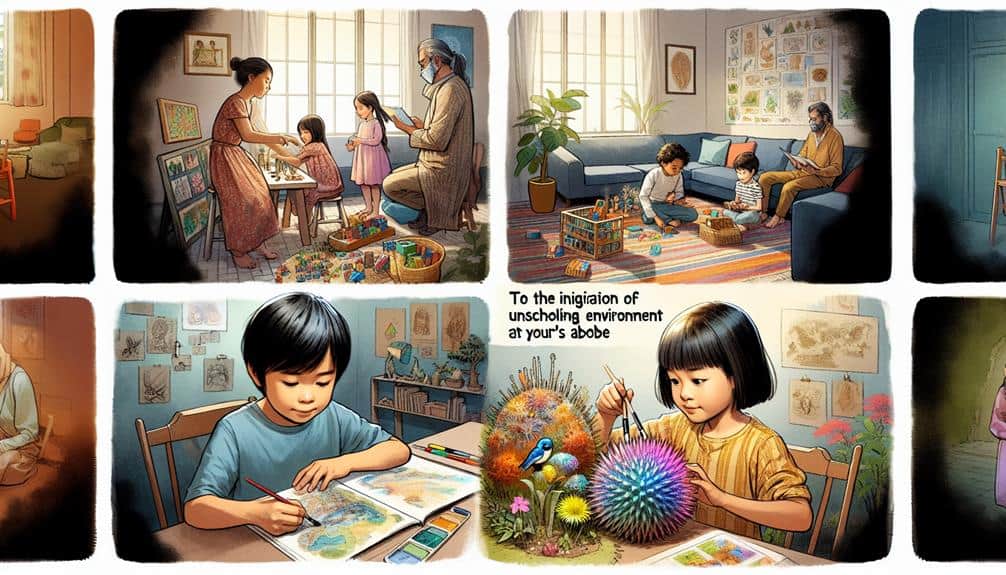Transform your home into an exciting learning hub by embracing unschooling techniques. Through play, kids learn at their own pace and deepen understanding by exploring topics of interest. Incorporate game-based learning, hands-on activities, and outdoor adventures to spark creativity and problem-solving skills. Encourage role-playing, engage in puzzles, and celebrate your child's achievements. From nature walks to indoor crafts, unschooling activities cater to all ages, enhancing fine motor skills, artistic expression, and problem-solving abilities. Foster open communication, curiosity, and hands-on experiences to create a playful learning environment that promotes critical thinking and exploration.Unlock the full potential of unschooling through interactive and creative educational experiences.
Key Points
- Incorporate game-based learning and hands-on activities for engaging education.
- Encourage role-playing and outdoor exploration to enhance learning experiences.
- Use puzzles and art projects to promote problem-solving and creativity.
- Foster open communication and celebrate achievements in child-led learning.
- Create a playful environment with critical thinking, exploration, and open-ended materials.
Benefits of Unschooling
One of the key advantages of unschooling is that it allows children to learn at their own pace, fostering a deeper understanding of subjects through self-directed exploration and curiosity. Unschooling advantages are numerous, with one significant benefit being the promotion of playful learning.
Through play, children engage in activities that aren't only enjoyable but also educational. This type of learning benefits children by enhancing their creativity, problem-solving skills, and social interactions. Playful learning encourages children to explore various interests and topics in a relaxed and enjoyable manner, leading to a more profound understanding of concepts.
Research suggests that incorporating play into education can improve cognitive development and academic performance. By integrating playful learning into unschooling, children have the opportunity to develop a genuine passion for learning, as they're actively involved in shaping their educational experiences. This approach not only allows for a more personalized learning journey but also instills a lifelong love for exploring new ideas and concepts.
Incorporating Play in Learning
How can play be effectively integrated into the learning process to enhance educational outcomes and foster a love for exploration and discovery?
Playful exploration and learning through games are powerful tools that can make education engaging and effective. Here are five ways to incorporate play in learning:
- Game-Based Learning: Utilize educational games to teach various subjects, making learning fun and interactive.
- Hands-On Activities: Engage in hands-on experiments and projects that encourage exploration and critical thinking.
- Role-Playing: Encourage imaginative play where children can embody different roles, promoting creativity and empathy.
- Outdoor Play: Take learning outside with nature walks, scavenger hunts, and outdoor games that stimulate curiosity and physical activity.
- Puzzle Solving: Use puzzles and brain teasers to develop problem-solving skills and enhance cognitive abilities in a playful manner.
Unschooling Activities for All Ages
To explore unschooling activities suitable for learners of all ages, consider a range of engaging and interactive educational opportunities that promote self-directed learning and holistic development.
Outdoor adventures provide a fantastic way to blend learning and play. For all ages, nature walks, camping trips, and gardening can foster curiosity, observation skills, and environmental awareness. These activities encourage hands-on exploration, critical thinking, and physical development.
Indoor crafts offer another avenue for learning through creativity. Activities like painting, crafting, or building projects help develop fine motor skills, artistic expression, and problem-solving abilities. Regardless of age, engaging in crafts can boost self-esteem, concentration, and innovation.
Embracing Child-Led Education
Embracing child-led education involves fostering a learning environment where children take the lead in directing their own educational journey, allowing them to explore their interests and learn at their own pace. By promoting child autonomy and self-discovery, parents or caregivers can facilitate a rich educational experience that caters to the individual needs and passions of each child.
- Encouraging Curiosity: Support your child's inquisitiveness by providing resources and opportunities to explore their interests.
- Flexibility in Learning: Allow your child the freedom to choose what, how, and when they want to learn about a particular subject.
- Hands-On Experiences: Engage your child in practical activities that promote self-discovery and deeper understanding.
- Open Communication: Foster open discussions to understand your child's learning preferences, strengths, and areas they want to explore further.
- Celebrating Achievements: Acknowledge and celebrate your child's milestones and accomplishments, nurturing their confidence and love for learning.
Creating a Playful Learning Environment
Fostering a playful learning environment at home can greatly enhance a child's educational experience by promoting creativity, critical thinking, and a love for exploration. Encouraging playful exploration allows children to learn through fun, making the educational process engaging and enjoyable.
To create this environment, incorporate a variety of hands-on activities such as science experiments, art projects, and nature walks. These activities not only help children develop important skills but also foster a sense of curiosity and wonder.
Setting up learning stations around the house can further encourage playful exploration. These stations can be themed based on the child's interests and can include books, puzzles, and educational games. Rotating the materials regularly keeps the environment fresh and exciting, stimulating the child's desire to learn.
Additionally, providing open-ended materials like building blocks or art supplies allows for limitless creativity and experimentation. By embracing play and fun in learning, you can cultivate a rich educational experience for your child right at home.
Resources for Unschooling Parents
Exploring available resources is essential for unschooling parents aiming to provide a well-rounded and enriching educational experience for their children at home. When maneuvering unschooling challenges, having access to online support can be invaluable.
Here are five resources to assist you in your unschooling journey:
- Online Communities: Join online forums and social media groups dedicated to unschooling. These platforms offer a space for sharing experiences, seeking advice, and connecting with like-minded parents facing similar challenges.
- Educational Websites: Utilize online educational platforms that offer a variety of resources, including lesson plans, educational games, and printable worksheets tailored to unschooling methodologies.
- Nature Centers and Parks: Embrace outdoor learning by visiting local nature centers and parks. These places provide hands-on experiences with nature, fostering curiosity and exploration.
- DIY Project Websites: Explore DIY project websites for creative and educational ideas. Engaging in hands-on projects can enhance learning experiences and promote critical thinking skills.
- Local Libraries: Take advantage of your local library's resources, such as books, audiobooks, and educational programs. Libraries offer a wealth of knowledge and opportunities for self-directed learning.
Frequently Asked Questions
How Can Unschooling Prepare Children for Standardized Tests?
To prepare for standardized tests through unschooling, focus on fostering creativity and critical thinking skills. Emphasize real-world applications of concepts, problem-solving activities, and hands-on learning experiences. Engage with diverse materials and encourage self-directed exploration to enhance test readiness.
Are There Any Legal Requirements for Unschooling at Home?
To unschool at home, you must adhere to legal requirements. Homeschool laws vary by state, covering aspects like notification, attendance, and testing. Familiarize yourself with these regulations to guarantee compliance and provide a structured, yet personalized, education.
Can Unschooling Hinder Socialization Skills in Children?
Unschooling may present socialization challenges but can foster unique opportunities for friendships development. Research suggests varied social interactions outside traditional settings can enhance adaptability, communication, and empathy skills, benefiting children in the long run.
What if a Child Resists Unschooling Methods?
If a child resists unschooling, open parent communication is key. Understand their perspective and concerns. Implement motivation strategies like setting achievable goals, offering choices, and creating a supportive environment. Flexibility and patience are crucial.
How Do Unschooling Parents Track Their Child's Progress?
To track your child's progress in unschooling, engage in ongoing progress monitoring through creative assessments. Collaborate closely with your child as a parent-teacher team to personalize learning experiences, adapt as needed, and celebrate achievements together.



